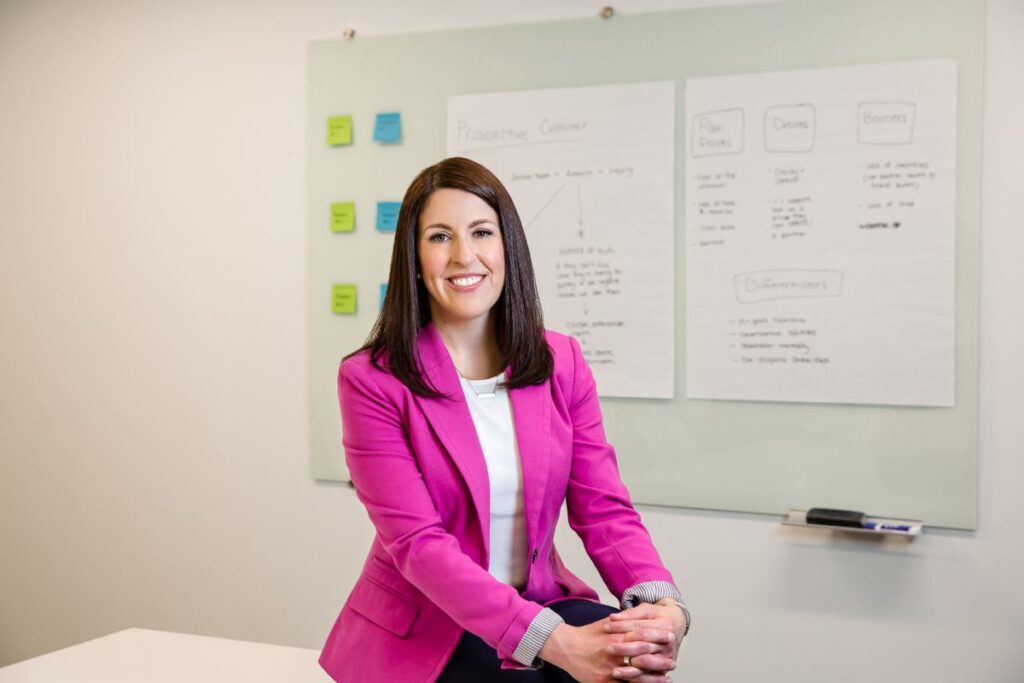Money Mindset Bootcamp
Last fall, I did a wonderful thing for my peace of mind, my bank account, and my future self: I enrolled in Money Mindset Bootcamp. It was my first online course, and I LOVED IT.
Believe me, I was deeply skeptical (and will continue to be, as you should too!) about the famed “passive income” online courses. But to me, this one by Australian Denise Duffield-Thomas is such a beautiful example of what an online course could and should be. In fact, I was so inspired that I felt granted the permission I apparently needed to build a strategy planning course for Ellevated Outcomes.
But today isn’t about us. Today, I want to tell you about this resource that I see as so complementary to our work at Ellevated Outcomes. It just blew my mind.

You may recall that our theme this year is Money & Meaning, and in fact, this money mindset course back in the fall, gave me the confidence to be unapologetic about this important 2021 mission.
You’ve heard me say before: in business (or in any achievement-pursuit), I believe that there are two parts to the whole: the technical tools, plus mindset. At EO we transparently say, “We’re not coaches; we’re not mindset experts. We do believe that mindset is important, and if that’s your top need, please go seek that expertise!
We’re people who thrive on the business-model side of the equation.” And conversely / admirably, Denise too, believes that the riches are in the niches. So she states the opposite: “I help your money mindset. You should hire advisors to help you with more technical aspects.” (I’ve paraphrased, but you get the point).
Each Sunday morning when the content opened, I woke up, brewed my coffee, started a cozy fire, and got to work: watching, writing, and doing the week’s exercises. I loved those Sunday mornings. I now possess dozens of pages of work and self-discovery that I constantly revisit, but three ahas, in particular, were wildly fascinating:
1. ROI = 2 weeks.
Of course, everyone’s results depend on what they put in; but I continue to tell friends this anecdote because it’s just so wild and makes me laugh out loud.
The price of this course is $2,000. And while that may seem like a lot for online, asynchronous material, it didn’t feel that way. I have a pretty keen sense about making solid investments for my admittedly super-conservative financial outlook. The downside to that is: I’m never going to strike it big from a speculative investment. My risk calculator is pretty detailed 🙂 I’m more of an incremental, it’s-a-marathon-not-a-sprint kind of woman.
The way I see spending money (especially when it’s business-related) is this: if it’s going to directly or indirectly make money, it’s an investment. My point of view, when I clicked “Purchase” on this course was: “I believe this has the potential to fundamentally shift my beliefs about money. So, what’s the upside? Long-term, it’s literally millions of dollars. So, can I make a $2K short-term trade-off in exchange for that? Makes investment-sense to me.
Then, within two weeks of starting the course, I found two unexpected checks in the mail (on a Sunday, of all days!) totaling $2,200. This luck / speedy return on investment flummoxed me!
2. I uncovered a few revealing money memories.
First, props to my mom, who generously answered lots of nosy questions about our family’s finances, during my childhood. She was a trooper, playing along and not getting defensive about anything.
One resurfaced memory of my youth was a choice I’d make each year for my birthday. I was allowed to throw a birthday party or take a $100 cash-out option. It’s not that my parents were business moguls or deal-makers; I think that they didn’t want the hassle of putting on a birthday party and may have spotted a blossoming business woman, haha. Spoiler alert: I always took the money.
What does this have to do with today, you ask? I think it’s at the core of my never-ending quest to evaluate (and re-evaluate) the smartest option on the table. In life and business, I constantly weigh allllllll the options, discerning where I can get the most bang for my buck. Do I sometimes miss out on some fun or feel guilty when I overindulge on an experience? For sure. So there are pros and cons, but generally, I’m pleased with my choice.
3. I now have a bank account ceiling.
Let me recognize outloud that statistically, this is the opposite problem from most people (especially Americans), and I realize that. Three things favor my financial life: I’m lucky, I had a wonderful corporate career, and I’m a saver.
I certainly realize that those things aren’t true for everyone; I’ve been gifted incredible opportunities. At the peak of my corporate career, I spent 30% – maybe 40% of my income. I always wanted to keep my “life overhead” as lean as possible. And this paid off. I’ve paid for several sizable life investments in cash and had plenty of breathing room to begin this very company. But the crazy thing is (and why I knew I needed help with my money mindset): I still felt insecure. I think that so many of us mistakenly think that there’s a magic number that will render us wory-less, never having to fret about money again. But that’s just not how it works.
Many people need a bank account “floor” – meaning, they can’t spend money unless they maintain a certain minimum. But I learned that in my personal life, I need a ceiling. Once my bank accounts hit a certain number, I need to find new investments to make, be them ventures, people, or learning opportunities. Money is energy and when used well, will multiply and regenerate itself*.
But here’s the biggest thing about this course (that I’m not sure one can put a price on): I’ve had this tremendous mental peace about money over the past six months. Once again, I can’t stress this enough: there’s a technical aspect to this, and we believe that you have to have the right tools in place. Yet: there’s a yin to the management yang. And when it comes to money, I believe that yin is mindset.
If you’ve done all the technical work; you have the advisors; you’ve done all the “right” things.. yet there’s still something off. An invisible force. A voice in your head. A block that you just can’t seem to put your finger on, standing between you and your financial potential, my head and my heart both recommend this work. If you’ve taken Money Bootcamp with Denise Duffield-Thomas, please comment below. I’d love to hear what you thought!
*I do feel like I need to add a major caveat: I am financially conservative in business and life, and meticulously manage my money in both realms. When working with clients on projections, cashflow, etc, I will often say, “I am coming at this from a conservative point of view. If you’re comfortable taking on more risk, you’re the CEO and absolutely can. I’m going to be the conservative money angel on your shoulder though, so I want you to know that!” This is one of the reasons our clients – and frankly, we – fared so well through covid and 2020. I think/hope that the EO team is content with a CEO who carries a cash reserve, ha!
And if you’d like more on that note: How I Manage Money, part 1, 2, & 3


